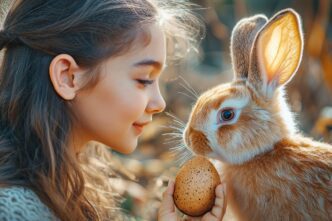Quick Takeaway
Animal & Element Origin
Impact on Personality
Diverse Interpretations
Children born under the Chinese Zodiac sign of the Rabbit—including those from years like 1951, 1963, 1975, 1987, 1999, 2011, and 2023—embody a unique blend of gentleness, intuition, and artistic sensitivity, often seeking peace and harmony in their surroundings. Understanding these inherent traits is crucial for parents and guardians who wish to nurture their Rabbit child’s natural gifts, helping them navigate a world that can sometimes feel too harsh, and guiding them toward a fulfilling and thriving life where their inherent kindness and creativity can truly flourish.
The Essence of the Rabbit Child
The Rabbit, fourth in the twelve-year cycle of the Chinese Zodiac, is traditionally associated with peace, prosperity, and longevity. Rabbit children are often described as serene, cautious, and highly perceptive from a young age. They possess an innate elegance and a deep appreciation for beauty, whether in art, nature, or human relationships.
These children are typically introverted, preferring quiet activities and intimate connections over boisterous crowds. Their gentle demeanor and empathetic nature make them wonderful friends and compassionate family members. They are often the peacekeepers, instinctively shying away from conflict and striving to maintain equilibrium.
Strengths: A Gentle Power
Rabbit children possess a remarkable set of strengths that, when recognized and encouraged, can lead to significant personal growth and success. Their intuition is often highly developed, allowing them to sense underlying emotions and subtle shifts in atmosphere.
Their creativity knows few bounds, frequently manifesting in artistic pursuits such as drawing, music, writing, or imaginative play. This imaginative capacity helps them process the world and express their rich inner lives. Furthermore, their diplomatic nature makes them adept at resolving disputes and fostering understanding among peers.
Challenges: Navigating a Complex World
While their gentle nature is a strength, it can also present challenges. Rabbit children are highly sensitive and can be easily overwhelmed by loud noises, chaotic environments, or critical remarks. They may internalize stress, leading to anxiety or withdrawal if not properly supported.
Their aversion to conflict can sometimes lead to indecisiveness or a tendency to avoid confronting issues directly. They might struggle to assert their own needs or opinions, preferring to go along with others to maintain harmony. Building resilience and a strong sense of self is vital for their development.
Nurturing the Rabbit Child: Practical Guidance
Parents and caregivers play a pivotal role in creating an environment where a Rabbit child can truly thrive. Tailoring your approach to their specific needs will help them blossom into confident, well-adjusted individuals.
Creating a Sanctuary of Peace
A Rabbit child needs a calm and stable home environment. Minimize unnecessary noise and conflict, and provide a designated quiet space where they can retreat when feeling overstimulated. Predictable routines also offer a sense of security that is deeply comforting to them.
Ensure their personal space is aesthetically pleasing and organized, as they are sensitive to their surroundings. A cluttered or chaotic room can feel unsettling to their peace-loving nature. Encourage them to personalize their space to reflect their own tastes.
Fostering Creativity and Imagination
Provide ample opportunities for creative expression. Stock up on art supplies, musical instruments, books, and materials for imaginative play. Encourage them to explore different mediums without pressure for perfection, focusing instead on the joy of creation.
Visit museums, attend concerts, and spend time in nature to inspire their artistic sensibilities. Validate their imaginative worlds and listen attentively to their stories and ideas, showing that their inner landscape is valued.
Building Confidence and Resilience
Due to their sensitivity, Rabbit children need consistent reassurance and positive reinforcement. Praise their efforts and small victories, focusing on their character and kindness rather than just achievements. Help them understand that mistakes are opportunities for learning, not failures.
Encourage them to gently step outside their comfort zone, offering support and a safety net. Teach them coping mechanisms for dealing with stress or criticism, such as deep breathing or talking about their feelings. Empower them to voice their opinions in a safe setting.
Teaching Healthy Communication and Conflict Resolution
Since Rabbits tend to avoid conflict, it’s essential to teach them constructive ways to express their needs and resolve disagreements. Role-play scenarios, discuss emotions openly, and model healthy communication within the family.
Help them understand that standing up for themselves doesn’t mean being aggressive, but rather communicating clearly and respectfully. Emphasize the importance of boundaries and how to assert them kindly but firmly.
Respecting Their Need for Solitude
While social connection is important, Rabbit children also require significant time alone to recharge their energy and process their thoughts. Do not force them into overly stimulating social situations or extracurricular activities if they show resistance.
Respect their need for quiet time and understand that their introverted nature is a source of strength, not a deficit. Balance social engagement with opportunities for solitary reflection and independent play.
The Elemental Rabbit: Deeper Nuances
Chinese Astrology further refines the Rabbit’s characteristics through the lens of the Five Elements: Wood, Fire, Earth, Metal, and Water. Each element adds a unique layer to the core Rabbit personality, influencing how a child experiences and interacts with the world.
Wood Rabbit (e.g., 1975, 2035)
Wood Rabbits are often the most compassionate and generous, with a strong sense of morality. They are natural helpers and community-oriented, but can sometimes be overly trusting. Nurture their idealism while teaching discernment.
Fire Rabbit (e.g., 1987)
Fire Rabbits possess more courage and ambition than their elemental counterparts. They are outgoing and passionate, but can also be prone to impulsivity or emotional outbursts. Guide their energy towards constructive goals and emotional regulation.
Earth Rabbit (e.g., 1939, 1999)
Earth Rabbits are practical, stable, and grounded. They are reliable and hardworking, valuing security and comfort. They might be more resistant to change and sometimes overly cautious. Encourage flexibility and openness to new experiences.
Metal Rabbit (e.g., 1951, 2011)
Metal Rabbits are known for their sharp minds, determination, and strong sense of justice. They are organized and disciplined, but can also be rigid or overly critical of themselves and others. Teach them self-compassion and adaptability.
Water Rabbit (e.g., 1963, 2023)
Water Rabbits are highly adaptable, empathetic, and intuitive, often possessing a profound understanding of emotions. They are gentle and flexible, but can sometimes be indecisive or easily swayed by others. Help them strengthen their inner resolve and decision-making skills.
Harmonious Relationships with Other Signs
Rabbit children generally get along well with most signs due to their amiable nature. They often find strong connections with the Goat (Sheep/Ram) and Pig, who share their appreciation for peace and comfort. The Dog also makes a loyal and understanding companion.
Understanding these compatibilities can help parents foster positive sibling dynamics or select playmates that complement their Rabbit child’s temperament, ensuring harmonious social interactions.
Conclusion
The Rabbit child is a precious gift, bringing gentleness, creativity, and a deep desire for harmony into the world. By understanding their unique traits, both strengths and sensitivities, and providing a supportive, loving environment, parents and guardians can empower these remarkable children to embrace their authentic selves, develop their inherent talents, and ultimately thrive as empathetic, well-rounded individuals who enrich the lives of everyone around them.








